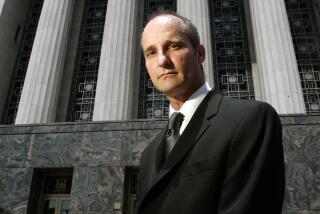No Trial for 2 Who Say DEA Acted Improperly
- Share via
A federal judge denied a new trial Monday for two narcotics defendants who contend they were convicted as a result of government misconduct that included the concealment of evidence and perjured testimony by two informants for the Drug Enforcement Administration.
U.S. District Judge Dickran Tevrizian issued his ruling without comment after a lengthy hearing in which defense lawyers said the prosecution either had deliberately misled the judge and jury or had been given false information by the DEA.
At issue in the case was the role of Guillermo Francisco Jordan-Pollito, who has earned more than $350,000 as a DEA informant over the last decade, and Jose Agapito Gomez, one of five “subinformants” paid by Jordan-Pollito for help in setting up drug stings.
In the case before Tevrizian, Pedro Alberto Parra Jr. and Enrique Hermosillo were convicted earlier this year of selling methamphetamines to Jordan-Pollito. They face 15 to 20 years in prison. Parra, an ex-Marine with no prior convictions, testified at trial that he was the victim of illegal entrapment by Gomez, a former schoolmate, who allegedly pressured him to get involved in the transaction.
Arguing for a new trial Monday, defense lawyer Ronald O. Kaye charged that the prosecution prevented the defense from gaining access to telephone records that would have shown convincingly that Parra was entrapped by Gomez. The government contended that Gomez did nothing more than introduce Parra to Jordan-Pollito.
Kaye said those records showed that Gomez had made 52 phone calls to Parra during a three-week period leading up to the latter’s arrest along with Hermosillo in Santa Ana. He said those calls were interspersed with 158 other calls between Jordan-Pollito and Gomez during the same period.
Assistant U.S. Atty. Patrick Fitzgerald countered that the jury had ample opportunity to assess the credibility of the informants in the case and that testimony about the frequent calls was presented at trial.
The defense also cited a recent ruling by U.S. District Judge Florence-Marie Cooper throwing out an indictment against three other defendants in a drug case involving the same informants.
In that case, Cooper found that the government’s representations about the two informants were not credible.
But Tevrizian said Monday that did not constitute new evidence justifying a new trial in his court.
More to Read
Sign up for Essential California
The most important California stories and recommendations in your inbox every morning.
You may occasionally receive promotional content from the Los Angeles Times.










